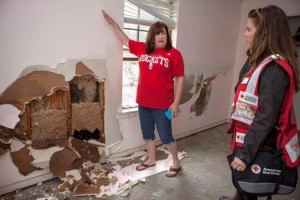Situational Overview
As much of the country looks forward to Easter weekend, thousands of people in Louisiana, Texas and Mississippi are still dealing with the impacts of severe and widespread flooding. For more than two weeks, communities across the South and Gulf Coast have endured intense rainfall and record-breaking flooding. The Sabine River flooding on the Texas and Louisiana border has broken records held since the 1880s and the Red River in Louisiana hit its highest level in more than 70 years. And this week, portions of the southern U.S. will face the return of severe thunderstorms and flooding, raising additional flooding concerns for already drenched terrain throughout the lower Mississippi Valley.
The American Red Cross is there on the ground, working around the clock to support individuals and families in need. On Tuesday, more than 270 people spent the evening in 16 Red Cross and community shelters in Texas, Louisiana and Mississippi.
Since severe storms and flooding began earlier this month, more than 1,500 Red Crossers, both staff and volunteers have:
- Opened 60 shelters which have provided more than 4,000 overnight stays;
- Distributed more than 70,000 relief items; and
- Served more than 170,000 meals and snacks for impacted residents.

(Photo Credit: Danuta Otfinowski / American Red Cross)
Monica and Robert Smith lost nearly everything when their Deweyville, Texas home filled with five feet of water last week. “Everything that we own is now in the yard. We only had a few hours to evacuate, so we left it all behind.” Monica has lived with her family in Deweyville her entire life, and has never seen a flood of this magnitude. In the photo below, Monica shows a Red Cross volunteer just how high the water was. “I am so thankful to this community, my neighbors, and the Red Cross” she said. “I am not sure how I would have handled this situation without help.”

(Photo Credit: Danuta Otfinowski / American Red Cross)
Impacted residents visit MARCs for cleanup supplies, hot meals, emotional counseling and health services, including 75 year old Maybel Bordelon from Orange, Texas. “Everyone here is so friendly and kind. Everyone is town is talking about the help that Red Cross is providing. We are so thankful you are here.”
Texas
More than 60 people spent Tuesday evening in nine Red Cross and community shelters in Texas. The Red Cross is also helping to operate four Multi-Agency Resource Centers (MARCs) throughout impacted areas. To date, Red Crossers have served more than 22,500 meals and snacks, and distributed more than 25,000 relief items to individuals and families in need in Texas. Disaster teams are continuing to focus on immediate sheltering and feeding needs, and the distribution of relief items, such as bleach, work gloves, rakes and shovels, in the next week.
Louisiana
The Red Cross is currently helping to operate six shelters throughout flooded areas in Louisiana, helping to provide a safe place to stay for more than 200 people on Tuesday night. Damage assessment teams have estimated that 12,000 homes in Louisiana have been impacted by severe flooding. In areas that are safe to enter, Red Cross disaster teams are distributing relief items out of shelters and emergency response vehicles circulating impacted areas. To date, nearly 32,500 items, including shovels, rakes, bleach and work gloves, have been provided to help individuals and families with cleanup efforts.
Mississippi
An estimated 2,600 homes have been impacted by severe flooding in Mississippi, and since heavy rains and subsequent flooding began on March 10, the Red Cross has opened 12 shelters which provided more than 400 overnight stays for impacted residents. Throughout shelters and out of emergency response vehicles circulating impacted areas, Red Crossers have served more than 13,000 meals and snacks for those in need. And Red Cross disaster teams continue to distribute relief items, such as rakes, shovels and trash bags, to residents beginning the cleanup process – more than 12,000 items have been dispersed to date.
The Red Cross estimates that we will spend between $4 million and $7 million helping people affected by spring floods and storms across Texas, Mississippi, Louisiana and Tennessee. This estimate includes the costs of providing food, shelter, blankets, cots, emotional support, health services, initial casework, relief supplies and sometimes longer-term recovery efforts. It also includes the costs that make relief possible, including logistics, staff and technology expenses. This is an evolving disaster and while our relief operations are ongoing, it’s not easy to project the exact cost of our future services. It’s important to remember that these figures are preliminary estimates that are likely to change. For instance, Red Cross expenses could change if additional flooding occurs or additional homes are found to be damaged.
Recovering from these severe flooding conditions will prove to be a long and trying process for residents in the South and Gulf Coast, but they won’t face these challenges alone. The Red Cross will remain in impacted communities in the weeks and months to come to provide a shoulder to lean on and the resources they need to return to a sense of normalcy.







Leave A Comment